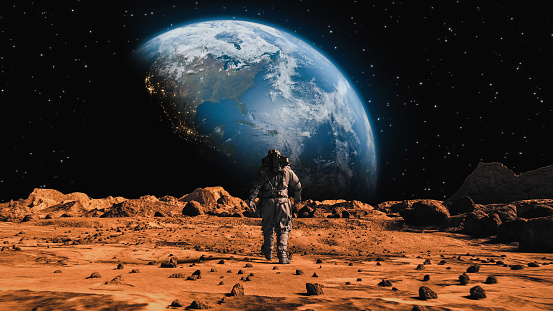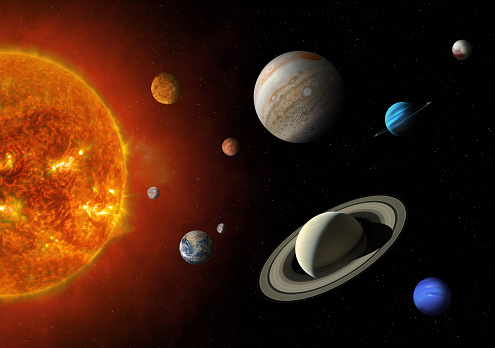
The Incredible Impact of the Red Planet In 2023? In recent years, Mars has captured the attention of scientists, space enthusiasts, and the general public alike. The Red Planet, with its unique features and potential for harboring life, has become a focal point for space exploration and scientific research.
The Exploration of Mars

Mars Rovers: Unveiling the Secrets of the Martian Surface
Since the arrival of the first Mars rover in 1997, NASA and other space agencies have continued to send advanced robotic explorers to the Red Planet. These rovers, equipped with state-of-the-art instruments, have provided us with unprecedented insights into the Martian surface, its geology, and the possibility of past water presence. The latest rover missions in 2023 have further expanded our understanding of Mars, paving the way for future exploration.
Martian Atmosphere: Studying the Climate and Potential for Life
Scientists have also been studying the Martian atmosphere to unravel its mysteries. The analysis of the thin atmosphere has revealed valuable information about its composition, weather patterns, and the potential for sustaining life. Recent studies in 2023 have shed light on the presence of methane and its fluctuations, leading to exciting debates about the possibility of microbial life on Mars.
Scientific Discoveries

Evidence of Liquid Water: A Game-Changer for Life on Mars
One of the most significant scientific discoveries in 2023 was the compelling evidence of liquid water on Mars. Scientists have long speculated about the existence of subsurface water, and recent observations have confirmed its presence in the form of briny flows. This discovery has revolutionized our understanding of Mars and its potential to support microbial life, opening up new avenues for exploration.
Fossils and Organic Compounds: Traces of Martian Life?
The search for signs of past or present life on Mars has intensified in 2023. Advanced instruments on the latest rovers have detected intriguing organic compounds and ancient fossils, suggesting the possibility of microbial life on the Red Planet. While these findings are still subject to further analysis and debate, they have sparked renewed enthusiasm for future missions and the quest to unravel the mysteries of Mars.
Human Colonization Plans

Mars as a Second Home: Ambitious Plans for Human Settlement
In recent years, the dream of colonizing Mars has gained significant traction. Private space companies and government agencies have outlined ambitious plans for establishing human settlements on the Red Planet. The year 2023 marked a pivotal moment in this endeavor, with the announcement of concrete steps towards realizing these goals. Projects such as the construction of habitats, life-support systems, and resource utilization techniques have taken center stage, igniting the imagination of aspiring Martians.
Challenges and Considerations: Overcoming the Hurdles of Martian Colonization
While the prospect of colonizing Mars is exciting, it is not without its challenges. The harsh Martian environment, radiation exposure, and the need for self-sufficiency pose significant hurdles. In 2023, extensive research and simulations were conducted to better understand and address these obstacles. Innovative solutions, including the utilization of Martian resources and the development of advanced protective technologies, have emerged, bringing us closer to the realization of long-term human habitation on Mars.
Read More: 10 Reasons to Love Pakistani Truck Art In 2023
Technological Advancements
Propulsion Systems: Making Interplanetary Travel a Reality
Advancements in propulsion systems have played a crucial role in expanding our capabilities for interplanetary travel. In 2023, significant progress was made in developing advanced propulsion technologies that could shorten the travel time to Mars. Concepts such as ion propulsion, nuclear propulsion, and innovative fuel sources have been explored, pushing the boundaries of our understanding and making the dream of reaching Mars a closer reality.
In-Situ Resource Utilization: Harnessing the Resources of Mars
To sustain long-term human presence on Mars, the concept of in-situ resource utilization (ISRU) has gained traction. ISRU involves utilizing the available resources on Mars, such as water ice and carbon dioxide, to produce necessities like water, oxygen, and rocket propellant. In 2023, significant strides were made in developing the technologies required for ISRU, bringing us one step closer to achieving self-sufficiency on the Red Planet.
The Future of Mars
With the remarkable progress made in 2023, the future of Mars appears to be promising. Scientists, engineers, and visionaries are working tirelessly to expand our knowledge of the Red Planet and prepare for future missions. The quest to find signs of life, establish human settlements, and unlock the mysteries of Mars continues to captivate our imagination, and with each passing year, we inch closer to realizing our ambitions.
Conclusion
In 2023, Mars made an incredible impact on the scientific community and the world at large. The exploration of Mars, coupled with groundbreaking scientific discoveries, has deepened our understanding of the Red Planet and its potential for sustaining life. Human colonization plans and technological advancements have propelled us closer to the dream of establishing a second home on Mars. The future holds immense possibilities, and as we unravel the mysteries of Mars, we pave the way for a new era of space exploration and human achievement.
FAQs
Is Mars the only planet being explored in 2023?
While Mars has garnered significant attention in recent years, other celestial bodies, such as the Moon and outer planets, continue to be explored and researched.
How long does it take to travel to Mars?
The duration of a journey to Mars depends on several factors, including the alignment of Earth and Mars, the propulsion technology used, and the desired mission objectives. On average, it takes around 6-9 months to reach Mars.
Can humans survive on Mars without protective gear?
No, the Martian environment is inhospitable to humans. The thin atmosphere, extreme cold, lack of breathable air, and high radiation levels make it essential for astronauts to have protective gear and habitats to survive.
What is the significance of finding liquid water on Mars?
The discovery of liquid water on Mars is significant because it suggests the possibility of life. Water is a crucial ingredient for life as we know it, and its presence increases the chances of finding microbial organisms or habitats suitable for life.
When can we expect humans to land on Mars?
While several organizations have set ambitious timelines for crewed missions to Mars, it is difficult to pinpoint an exact date. Realizing human landings on Mars will require further technological advancements, extensive planning, and international collaboration.












One Comment